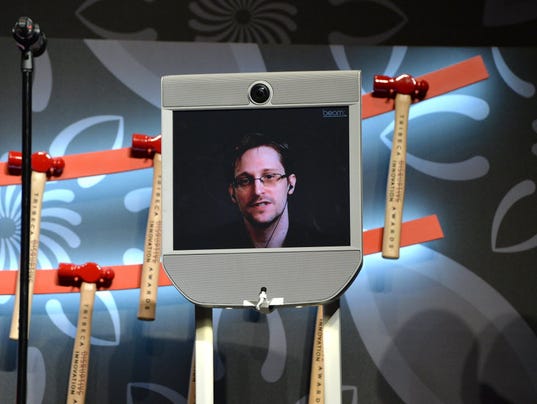Needed: More Snowdens - Ex-intel analyst
He made my job harder and most of my military colleagues hated him. But he did the right thing.
I was an active duty Marine working in signals intelligence in 2013 when Edward Snowdenexposed the mass surveillance programs of theNational Security Agency. Snowden’s alleged espionage had a lasting effect both on my work and on my attitude toward it.As a cryptologic linguist and intelligence analyst, my day-to-day activities were directly compromised when I was suddenly unable to use certain methods and tools due to the leak. Not only that, Snowden’s action created a moral dilemma for me as a member of the intelligence community. I began questioning the morality of my work. If the public was outraged by what Snowden leaked, will they be outraged by how the U.S. is fighting terrorism?The Marine Corps is an organization brimming with intense patriotism, and Snowden’s leak undoubtedly made the job of all intelligence personnel more difficult. He instantly became a hated enemy to the majority of the intelligence community. It was not uncommon to hear the sarcastic comment “thanks Snowden” somewhere in the office on any given day.STORY FROM HONDAFastest seat in sports 360Unlike in the rest of the country, there was no controversy about whether Snowden was a hero or a traitor; blatant treason was how most military members viewed what he did. I believe that we need people like Snowden to keep our government in check. But any disagreement on my part would have put my own security clearance at risk, so I kept my unpopular opinion to myself.Snowden, speaking Thursday to the University of Chicago’s Institute of Politics in a virtual webcast, called his release of documents a public service and compared it toMartin Luther King’s civil disobedience. Yet it seems that Snowden’s disclosures have done little to affect the NSA.Mass surveillance, the monitoring of an entire population by governments, has seen wild growth in the USA since the terrorist attacks of 9/11. By 2013, NSA had built what is likely the largest domestic intelligence apparatus in history. By 2015, the agency had far more domestic data than it could use. For more than a decade, the NSA has been spying on U.S. citizens, infringing upon their rights in the name of national security.The response from proponents of mass surveillance has been some variation of the idea that we need mass surveillance to fight terrorism; that by weakening the NSA’s surveillance abilities, we are letting the terrorists win. When the Senate passed theUSA Freedom Act, which was to end bulk collection of domestic data, Senate Majority Leader Mitch McConnell called the bill “a resounding victory for those who currently plotted against our homeland.”In the three years since Snowden’s leak, government agencies appear to have grown more brazen than ever in their lack of respect for our constitutional right to privacy. The NSA has been able to continue and even increase its surveillance efforts with little backlash from the public. In fact, the Pew Research Center found in December that only 28% of Americans were worried that anti-terror policies had gone too far in restricting civil liberties. Twice as many — 56% — were concerned that the government hadn’t gone far enough to protect the country.POLICING THE USA: A look at race, justice, mediaBut this doesn’t mean that the NSA should be allowed free rein, or that we can rely on the NSA to keep itself in check. This is an organization with a history of privacy rights infringement, best known for its secrecy. There’s even more reason now for unease.Historically, the excuse of national security has led to loss of basic human rights within a clearly defined wartime period. That is not the case with today’s war on terror. There is no conventional force; unlike previous wars, the enemy is not one race, at one location, with one goal. We cannot define how, when, or whether victory will even be achieved. That means the relinquishment of privacy for the sake of national security is especially dangerous for this conflict; our loss of privacy rights could extend for an unknown amount of time.We must not falsely be convinced that our right to privacy is less important than national security. If we continue to accept our government’s reasons for domestic mass surveillance, the United States will become reminiscent of George Orwell’s1984. Domestic mass surveillance is not the solution to ending terrorism, and it never will be.Dan R. Sendik, a computer science student at Columbia University, spent five years in the Marine Corps as a signals intelligence analyst handling highly classified information.In addition to its own editorials, USA TODAY publishes diverse opinions from outside writers, including our Board of Contributors. To read more columns, go to the Opinion front page and follow us on Twitter @USATOpinion.
Wednesday, May 18, 2016
Needed: More Snowdens - Ex-intel analyst
Subscribe to:
Post Comments (Atom)



No comments:
Post a Comment